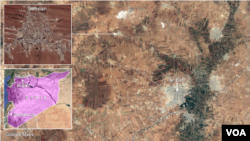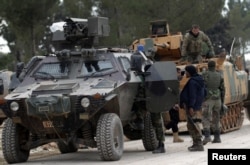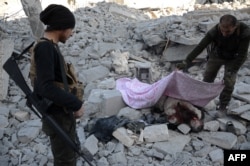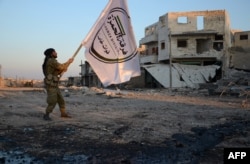A second suicide car bomber hit the location of an earlier explosion Friday in a Syrian village near al-Bab, a day after Turkish forces and their rebel allies took much of the strategic town from Islamic State (IS) fighters.
The death toll reached 65 people, including many civilians, rebel fighters and at least two Turkish soldiers, according to local media and Turkish officials.
The first blast Friday struck an opposition security post in Sousian, killing many civilians along with opposition forces and two Turkish soldiers.
People had gathered at the security office, where many of them were seeking permission to return to al-Bab, which had been the scene of heavy fighting for months.
The second attack came as local residents and rescue teams were retrieving bodies of those killed in the earlier attack, reports said.
IS claimed responsibility for the first attack in al-Bab, saying it had killed eight Turkish soldiers and 60 rebel fighters, according to the pro-IS Amaq news agency.
As IS is losing ground in al-Bab, observers predict, the terror group will rely on such attacks to indicate competence against Turkish forces and Syrian rebels.
“They will keep trying to infiltrate their opponents’ positions,” said Zara Seyda, a Syrian reporter who is covering the fighting in al-Bab. “This loss came heavy on [IS] and its supporters, so they will make up for it carrying out such attacks.”
IS fighters have carried out similar suicide attacks in the past after losing territories in Iraq and Syria, analysts say.
“This [suicide attack] is more like avenge as opposed to fighting strategy,” said Sadradeen Kinno, a Syrian affairs researcher. “They soon come out with a statement, condemning these rebels as ‘apostates’ and then they will put the al-Bab loss behind.”
Securing al-Bab
The Turkish and rebel forces moved into the town Thursday after Islamic State fighters withdrew, ending the battle for the IS stronghold, according to Turkish media and Syrian activist groups.
“Almost all of al-Bab is under control now and a sweep operation is ongoing,” Fikri Isik, Turkey’s defense minister, told the Turkish state-run Anadolu news agency.
IS fighters were reportedly heading south to other IS-held Syrian territories. A few scattered IS fighters remained hiding among locals, according to reports from the town.
A Syrian monitoring group said Turkish-backed forces are moving neighborhood by neighborhood to secure al-Bab.
“The northeast neighborhood of the town has not been combed yet,” said Rami Abdulrahman, head of the British-based Syrian Observatory for Human Rights, a group that has monitors on the ground across the country.
Clearing the city
Rebels and Turkish forces found land mines and other explosive devices while sweeping districts recently recaptured from IS fighters, he said. And this has slowed the process to clear off the town entirely from remaining IS fighters, analysts said.
“IS fighters may be among the civilians, so they (Turkish forces) have to be extremely careful,” said Metehan Demir, a Turkish military analyst in Ankara. “I would say it will take at least another week or so to make sure that IS has been cleared of al-Bab.”
At least 127 civilians were killed, including 38 children, in this week’s final assault on al-Bab, the Syrian Observatory reported.
IS had held thousands of civilians in al-Bab using them as human shields to deter advances by the incoming forces.
With al-Bab under Turkish control, questions are being raised as to what the next move for Turkish forces would be.
Turkish officials have said their next objective after al-Bab is to go after IS in their de facto capital of Raqqa. Ankara has also said that it wants to dislodge the Kurdish fighters from the town of Manbij.
Those moves may face Trump administration opposition, analysts say.
“Turkey desires to go to Manbij and Raqqa, but there is a problem with Washington,” analyst Demir said. “The U.S. does not seem anxious about [a] Turkish contribution in Raqqa.”
Joint strategy
Washington and Ankara have held discussions in the past week over a joint strategy to fight IS, American and Turkish officials said.
“On the issue of fighting [Islamic State], we - that is Turkey and Saudi Arabia - will be cooperating with the United States,” Turkish Foreign Minister Mevlut Cavusoglu said last week. “We believe that the fight from now on will be more effective and that we will be able to clear both Syria and Iraq” of IS.
U.S.-backed Syrian Democratic Forces (SDF), a Kurdish-led coalition, has made significant advances on IS near Raqqa, seizing tens of towns and villages in the northern and western parts of the province.
The SDF has also cut off a supply line that connects Raqqa to Deir Ezzor, another IS stronghold in eastern Syria.
The Kurdish YPG is the backbone of the SDF. But Turkey views it as a terror group and has vowed to combat them in parts of northern Syria.
Kurdish military officials, however, say that the Turkish military is incapable of leading the offensive toward Raqqa.
“It took Turkey and its allies more than two months to reach al-Bab,” said Nasir Hajj Mansur, a Kurdish commander with the SDF. “So Raqqa is going to be even harder for them if they decided to head there.”








